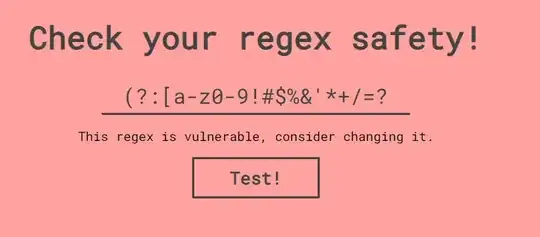I would like to verify that the input from the user complies to the format of email address (in Java application). On the following page there is verbose regex that should properly validate the email http://emailregex.com/ (RFC 5322 Official Standard).
(?:[a-z0-9!#$%&'*+/=?^_`{|}~-]+(?:\.[a-z0-9!#$%&'*+/=?^_`{|}~-]+)*|"(?:[\x01-\x08\x0b\x0c\x0e-\x1f\x21\x23-\x5b\x5d-\x7f]|\\[\x01-\x09\x0b\x0c\x0e-\x7f])*")@(?:(?:[a-z0-9](?:[a-z0-9-]*[a-z0-9])?\.)+[a-z0-9](?:[a-z0-9-]*[a-z0-9])?|\[(?:(?:25[0-5]|2[0-4][0-9]|[01]?[0-9][0-9]?)\.){3}(?:25[0-5]|2[0-4][0-9]|[01]?[0-9][0-9]?|[a-z0-9-]*[a-z0-9]:(?:[\x01-\x08\x0b\x0c\x0e-\x1f\x21-\x5a\x53-\x7f]|\\[\x01-\x09\x0b\x0c\x0e-\x7f])+)\])
If I validate regex through this online tool http://redos-checker.surge.sh/ it says that this regex is vulnerable to ReDoS.
Is this true. Could someone craft such pattern that it would halt the evaluation of this regex pattern? Or at least it would take more than 3s?
Is there some tool available that could craft input which could potentially break evaluation, based on the regex itself?
